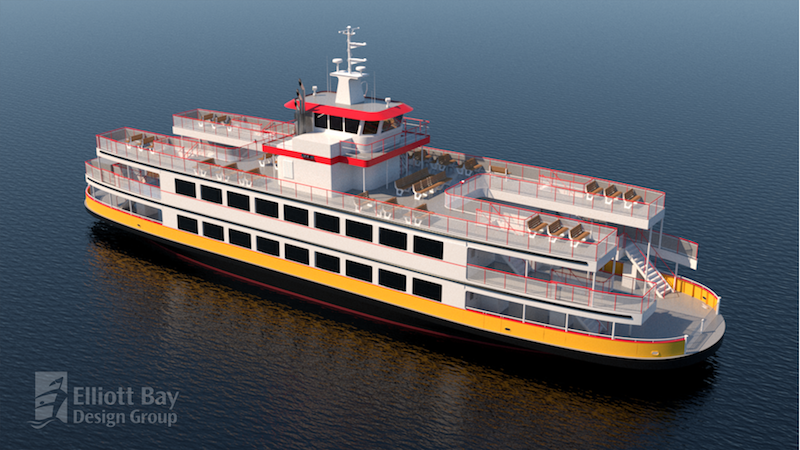Casco Bay Lines (CBL), Portland, Maine, continues to make progress on the construction of its new $25 million 599-passenger double-ended hybrid-electric ferry at Senesco Marine, North Kingstown, R.I.
The 164' passenger-vehicle ferry will replace an existing diesel-powered ferry, the Machigonne II, a 36-year-old 122’x37’ passenger-vehicle ferry that services Peaks Island in Casco Bay. CBL estimates that the change will result in a reduction of 800 tons of carbon dioxide a year.
The average age of CBL's fleet is over 26 years old. The useful life of a passenger ferry is around 30 years.
The ferry, designed by Elliott Bay Design Group (EBDG), also has room for 15 vehicles. It is expected to enter service in 2024.
Hank Berg, general manager at Casco Bay Island Transit District (CBITD), spoke at a recent Propeller Club Meeting in Portland on its plans to update the ferry fleet with diesel-electric hybrid technology.
With one of the first public diesel-electric hybrid passenger ferries to hit U.S. ports, CBITD is at the forefront of bringing alternative propulsion to passenger ferry systems.
The new passenger-vehicle ferry will be a true hybrid vessel with the ability to operate using a diesel-electric system, a zero-emissions, fully battery-powered system, or a combination of the two.
Due to pandemic-related supply chain problems, the hybrid ferry's cost has risen to $25 million, an increase of about 75% over EBDG's $14.2 million estimated cost in 2021.
Spear Power Systems will provide the ferry's lithium-ion batteries, with a goal to achieve a 10-year battery life. The batteries will be charged only at the Portland location, and the Peaks Island service schedule only allows for a 10-minute charging window. CBL has purchased a German-based Stemmann-Technik charging system. Upon docking, the captain will deploy a charging mechanism that can be attached within 30 seconds. The charger requires 1.3 MW to operate.
One of the challenges ferry operators face is electrical demand rates. It would be cost-prohibitive to charge the ferry during peak demand rates. CBITD supports a proposal from Maine’s Public Utility Commission to implement reduced rates for electric vehicles.
The difference in cost would be drastic, “pennies versus $15 per kilowatt hour,” Berg noted.
If the proposal is not approved, the company has a Plan B at the ready: battery banks. To bring down charging costs, batteries positioned at terminals would be charged during non-peak demand rates and discharged during hours of operation.
The Peaks Island service is a 4.5 nautical-mile round trip that uses 220 kWh.
CBITD is also planning to replace the 29-year-old Maquoit II. The design phase of the Maquoit II replacement project is expected to begin this summer, with construction starting in 2025. The estimated delivery date is the spring of 2026.




